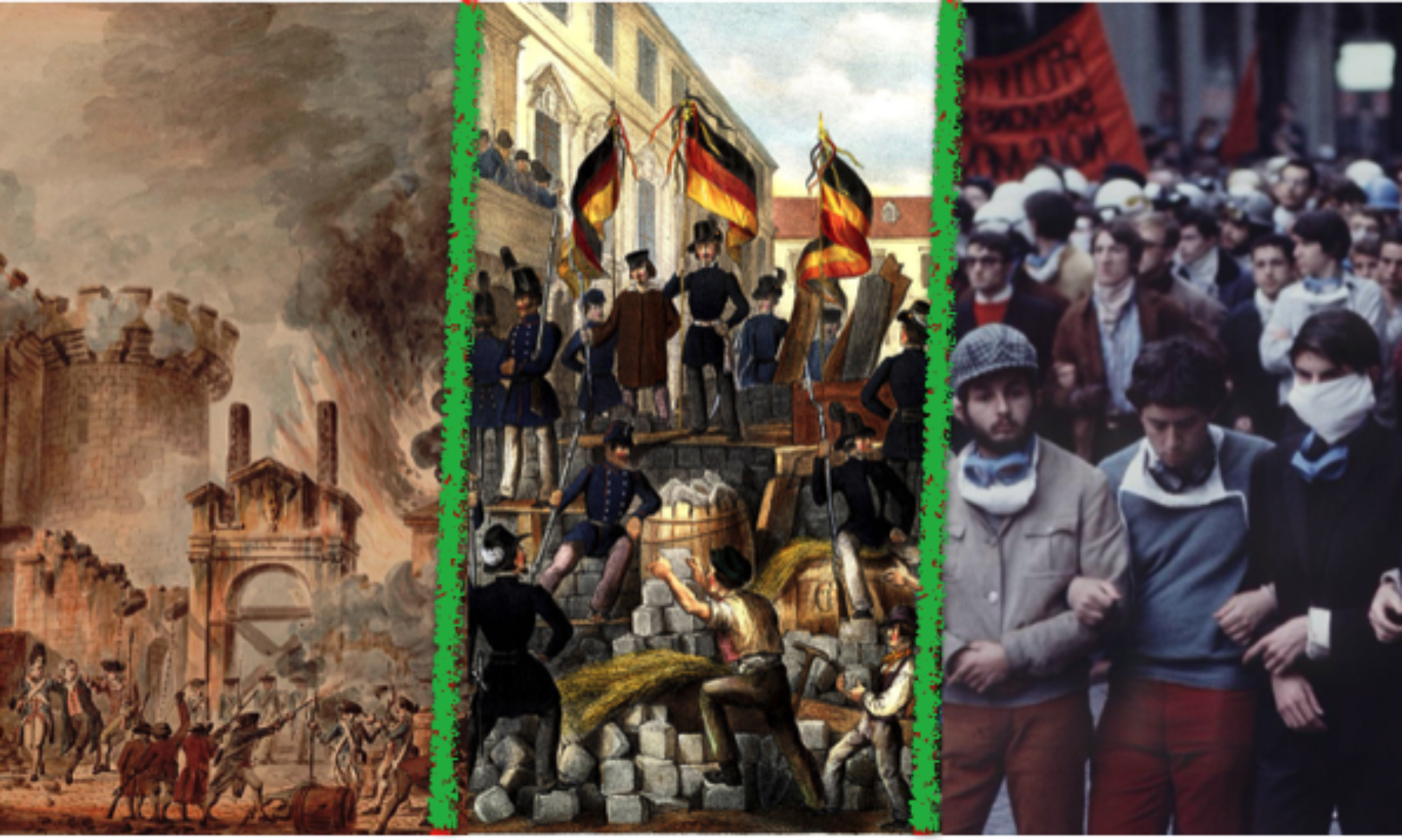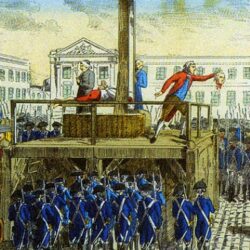I found the graffiti and posters portion of the assignment to be very interesting to look at. As I was scrolling through, I thought of the difficulty that comes with trying to make such a large impact with such little explanation/images. I keep close-reading each of them as though they are poems or something and I think it is helpful. One that I really have been considering it on Page 100 and notice more each time. The first statement of “No Exams” seems like a shallow statement enough, but how can it make one think deeper about the impact of the higher education system when paired with the rest of the text. Is the writer suggesting that having exams is a form of interfering with someone else’s freedom? Is participating in the education system of this time really contributing the deeper issues of capitalism? And can revolution not truly happen while participating in them? Furthermore, how does this all get complicated by the last line of “people who talk about revolution and class struggle without reference to every day reality talk with a corpse in their mouth.”? Is it contradictory? or does it make sense. Wondering what everyone thinks. I know this is some pretty deep thought for one of these posters, but I think that’s the intent of making them.
Europeonism and Erasure of Developing Nation Struggle
As I was reading the second reading for today’s class, I was once again taken aback by the way that European protests aren’t exempt from also being a facet of empire. On page 239, the text describes how these student movements looked to the developing world for inspiration amid postcolonial struggles and revolution.” The texts proceeds to explain the ways in which Europeans centralized themselves in the protests. To me, this is in a way harmful because of the way it tokenized the struggles of the developing world, and proceeded to emphasize European empire by simply using problems caused by them as “inspiration.” I guess what I’m wondering is if these student protestors were so aware of the issues with Europe, why wouldn’t they let those in developing countries lead the way in revolution rather than take control as always,
Students’ Place in Revolution
In another class we discussed boomers and how they were in a way defined by being anti-establishment, but this reading made me question that a bit. I do agree that with events such as the counterculture movement and protests in general, that they were upset with the establishment, but I guess my question has more to do with WHY did they become anti-establishment. On page 155, in response to police brutality in the United States towards people who oppose the Vietnam War: “yknow if you’re a nice respectable law abiding white kid, it’s very terrifying to see policemen armed to the teeth coming at you with every intention of putting you in the hospital.” This quote doesn’t read as much anti-establishment as much as it reads “hey, what are you doing I’M supposed to be a PART of the establishment.” (Of course, I am referring specifically to the predominantly white student portion of protestors for this one).
Massimino Blog Post for 9/29
Upon reading Flora Tristan’s “The Worker’s Union” I was struck by how forward thinking her ideas were at the time. Describing the modern day workers’ unions that exist day, she stresses the importance of committing oneself to the collective in order to help the greater good. However, I worry about her oversimplification of the subject and harsh criticism of the worker. Near the beginning she stresses the need for unity, reminding everyone of how they have waited 25 years to be met with nothing (190). She insists they must protect themselves, which is true, but doesn’t seem to focus much on what they must protect themselves from. She hints at social contract being broken, yet doesn’t agree that the working class has earned the right to revolt. Do we think this is poor oversight of the situation or does she understand that the State is too powerful to go against?
Massimino 9/15 Law of April 4th
The language of this decree is amusing to me. It seems that they were suggesting that a revolt over slavery a “minor disagreement,” and that they were taking the situation out of proportion. Evidently I disagree, I think it is exactly the actions of the rebels that got this decree made. What do you guys think? Or furthermore, is this an attempt to maintain a sense of legitimacy (as in the revolt had already decided that slaves were free, but France wanted to say it so they could act like it was the decision of the nation)
Massimino Blog Post 9/10/20
“The Many Bodies of Marie Antoinette” proved to be a very interesting piece. I think it ties in very well with discussions we have already been having in class. For most of history, women remain a concept, never appreciated in reality, and yet are always placed in higher blame even when powerless in their situations. One can never talk misogyny without mentioning Rousseau, who blamed the downfall of men to always be at the hands of a woman’s “seducing and betraying” (211). Rousseau always manages to remain a perfect contradiction in describing the intrinsic evil that is woman all while insisting that the “natural order” of them is being in the private sphere as dainty and subservient creatures. In reality, Marie Antoinette had been moved to France as a young girl and arranged to marry Louis. Her “job” as Queen included nothing political. In fact, it was to represent the height of French society, which she did. For those familiar with the Madonna/Whore complex, it is very interesting to see her public image be shifted from one to the other. She doesn’t necessarily change, but the way in which she is perceived does. Personally, I think her legacy as the face of opulence and corruption in the monarchy is unfair and reflective of an inherently misogynistic society.
Massimino blog post for 9/1/20
Chapter 4 of Popkin concludes with an open ended inquiry of what exactly killed the chances of a Constitutional Monarchy for France. There was some talk of failure being “inevitable.” As historians, we should never be content with that answer. Personally, I draw the conclusion that the Constitutional Monarchy of France failed because the initially set post-revolution government was not as democratic or “revolutionary” as it claimed. The deputies had merely set up an oligarchy, still founded in giving power to wealthy, white men. However, the monarchy was the figurehead of their indiscretions. They drafted “The Declaration of the Rights of Man and Citizen,” but it was clear they did not truly believe equality and will of the people was as sacred as they fronted.I think a clear example of this can be found on page 54 that outlines the events of October 6th, 1789. While deputies were discussing what degree of power the monarchy would still possess, women from Paris took matters into their own hands to move the King and kill his guards. Had the deputies set up the government to truly be equal in practice and give more individuals a say in the new government, the French people would not have gotten so frustrated at the idea of the figurehead that was the monarchy. I am curious as to what others think on this subject.

